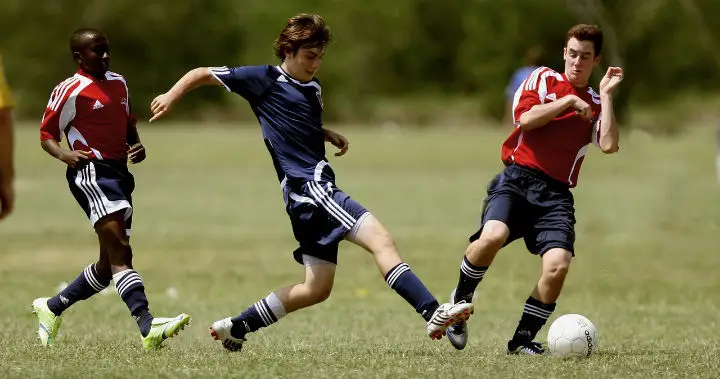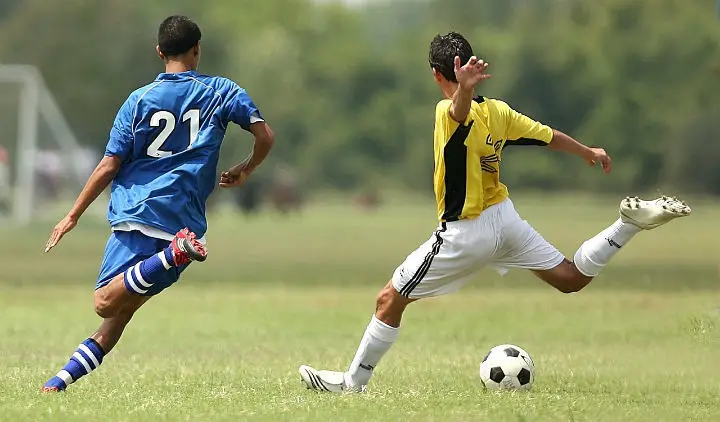If you’re an attack-minded player who can run like the wind with the ball at your feet, you have probably played as a winger in soccer at some point in time.
If you haven’t, that’s probably where you’d feel most at home – on the wings.
The winger is usually the go-to guy for a creative spark.
But in the modern game, they’re also expected to track back and help out with the defensive side of things.
Picture this…
A winger could be standing 50 yards away from goal, and 6 seconds later could be peeling away from goal to celebrate as the ball rolls into the back of the net. Destroyed defenders standing around stunned.
In short, a good winger knows how to get the crowd on their feet.
They symbolise the pure essence of football – thrills, skills, and goals.
So, just what kind of traits does a great soccer winger usually have?
What is expected of them out on the pitch in terms of their role and responsibilities?
How can one improve in and master this tricky position?
Read on and I’ll show you how to dominate as a winger in soccer…
7 Traits of a Great Winger in Soccer
To really master the winger position and dominate opponents...
You should look to have the following qualities:
1. Always be Unpredictable
Being unpredictable should be one of the first aspects of your game you should look to develop as a winger.
Defenders hate that in an opponent more than any other thing. And if you have that quality, it means you can rattle them.
You see, defending in soccer is a lot about being prepared…
Researching the opposition and trying to learn their moves and patterns to be able to predict their attacks and stop them.
If you’re unpredictable, the opposition won’t be able to prepare for you.
How do you become ‘unpredictable’?
By having as many options to play the ball as possible.
Or in case of attackers, having a variety of ways to get in behind the backline.
- Will he go straight or will he cut in?
- Is she going to shoot or thread the ball through?
- Will she cross or dribble into the box?
The best wingers can mix it up and leave their opponents always guessing what their next move is going to be.
This unpredictability also means their markers can never switch off in a game.
When defenders are constantly occupied with your positioning, it gives potential opening to your teammates.
2. Be a Direct Goal Threat
This should be one of the more basic requirements of playing a winger in soccer.
Leave the build-up play, ball-recycling, probing, and prodding to your central midfielders and playmakers…
A winger must be able to kick the ball with accuracy and be a direct goal threat.
If you’re a winger and you have the ball at your feet during an attack move, it should be a simple message to the defender…
“I’m coming to score. Try and stop me.”
That’s it.
Your job is to take the ball and do one of two things:
• Go for goal
• Lay off, pass, or cross the ball to a teammate in a better position to go for goal
Don’t misunderstand…
The other stuff like tracking back and supporting your fullback are still part of your job. You can’t neglect those.
But they aren’t your forte. That’s not why you were picked in the team.
Your primary goal is to score goals or help your teammates score goals.
3. Creativity and Trickery with the Ball
A winger who can’t dribble well enough to beat defenders one-on-one and get behind the lines is like a striker who can’t shoot, or a defender who can’t tackle.
If you want to be unpredictable, which is winger 101, you need a few go-to ball-skills to use throughout the match.
Remember you have to beat your marker…
And unless you’re incredibly quick with the ball, it’s hard to do that successfully on a consistent basis.
You will always meet the odd player who sprints faster than you, and will catch up to you in a flat-out race. Besides, it’s always smarter not to burn away your energy simply racing players up and down the pitch.
You must have at least two or three ball tricks that you can switch between to keep the defenders guessing.
And they don’t have to be elaborate, flair tricks of the level of a Neymar or Ronaldo.
No at all…
Here are some very basic tricks you can easily make a part of your repertoire:
- A simple change of pace to throw off a marker
- Quick changes in direction to make them lose balance
- Shuffling the ball from one foot to the other can bait a defender into thinking you’re changing directions
- Body feints work the same way
Think these are too simplistic?
Some of the best wingers in the world rely primarily on these simple techniques.
If you like this article, Follow us on FACEBOOK and INSTAGRAM and PINTEREST!

4. Positional Awareness and Discipline
Wingers are ones who usually enjoy the most freedom of movement in a team…
But that doesn’t mean they are exempt from maintaining basic positional discipline.
The very best wingers in soccer also help their teammates out defensively. And that means tracking back and marking the opposition’s fullback or winger.
It’s simple…
When a winger attacks open space in the opposition’s half, they must remember that they’re also vacating their own designated zones.
This means a similar space is available to the opposition attack if your team happens to lose possession.
On a smart team, this space can be filled by the fullback or a midfielder.
Which is why wingers must be in constant communication with their fullbacks or the central midfielders who may also cover for them.
And it’s not that positional discipline is from purely defensive perspectives either…
A winger in soccer is first an attacker before anything else.
As a winger, you must find the best positions to receive a pass or a through ball from teammates. Positions out wide by the touchline (or wings) are ideal because play generally stays more central.
Wingers have several options for advancing during attacks:
- Moving in or deeper to receive the ball at your feet
- Running in behind along the touchline to receive a lobbed ball
- Using overlapping runs with your fullback
- Quick one-touch exchanges with a midfielder to advance upfield
Whichever move it is, wingers in soccer must be ready to make quick decisions.
5. Hunger for Possession
A near insatiable hunger for the ball defines every winger in soccer…
No matter how many times you’re kicked, harried, fouled, or mocked by the opponents or their fans, wingers want their to have the final word.
Picking themselves up off the floor for the umpteenth time, they demand the ball and drive the team forward with their wizardry on the wing.
And sometimes, you might even be attacked by your own fans…
Not many remember Cristiano Ronaldo’s early years at Manchester United.
He came in as a record teenage signing, and wowed everyone with his dazzling skills in his first year. But the sheen wore off as he struggled to produce an end product from all that flashy play.
And soon, even United fans began to tire of it, and voiced their frustrations.
But did he crumble?
You already know he didn’t. He transformed himself…
- He bulked up significantly to be harder to push off the ball.
- Worked tirelessly on his finishing.
- Developed a fairly rare style of shooting – the swerving knuckleball shots that he’s now famous for.
- Worked hard on his gameplay to be of greater value to his teammates, be it passing, movement, or crossing.
In a couple of seasons, he was the world’s best. But that’s not half as important as how hard he worked for the team. Or how strong he became mentally.
This bravery and daring is key to being a winger…
6. Excellent Fitness
All that sprinting up and down the wings, you can imagine the sort of fitness it takes to do it for 90 minutes.
Wingers in soccer need to be supremely fit.
You don’t want to be that player who was so exhausted in the 89th minute that they lost track of their opponent and couldn’t keep up as they put the ball in the back of the net.
Wingers need to have a high level of stamina and energy.
They’re one of the players always on the move, always looking to make runs regardless of whether they get the ball or not.
So, if you want to last the full 90, work on your stamina.
And play smarter to conserve it during games.
7. Produce the Goods Every Game
Finally, you’re not a good winger in soccer unless you’re recognised as a real threat by your opponents.
As a winger, you have to produce the goods in every game.
And by goods, we mean the final product for a soccer winger:
- A goal
- A pin-point cross that sets up a teammate
- An assist or key pass
- Winning a free-kick in a dangerous area
Getting some or all of these in each game defines your worth more than anything as an attacking player.
And as you do that consistently, you earn a reputation…
Opponents will fear you, and go out of their way to try and neutralise you. And while that might make your job harder, it takes the heat off other attackers on your team.
That’s one indirect, but major way wingers contribute to the team cause.
The Roles and Responsibilities of a Winger
The winger’s is a multidisciplinary role in the team, one that demands:
- Discipline
- Hard work
- A relentless desire to fight for the team
Wingers in soccer often have a very misleading image as selfish, flair players.
Or players who are there just to fire up the crowd and put defenders on their backsides.
Great wingers, however, are balanced and single-minded in their desire to score and win games for their team. They do whatever it takes to keep the ball and put it into the back of the net.
Let’s get into the specific responsibilities…
1. Scoring or Delivering Goals
As attacking players, this is what’s mainly expected of wingers.
If your gameplay isn’t directly leading to goalscoring opportunities for your side, you’re not doing your job well.
Tricky play is somewhat expected of wingers, but if they are not backed up with an end product then these creative attempts quickly become a hindrance to the team.
As well as creating goalscoring opportunities for teammates, wingers are also expected to get in amongst the goals.
Having a sizeable goal total at the end of a season raises your threat level as a winger by a lot.
Also, most wingers spend too little time training their crossing skills.
Delivering a pin-point cross bypasses the entire defensive backline, and is a tremendous ability to possess.
Don’t neglect it.
2. Creating Havoc For the Opposition Defence
The attacking third of the pitch is where wingers really come alive and impact the game.
While some wingers hug the touchline, others are inverted wingers who prefer to come inside to affect the play.
In general though, wingers need to be able to mix it up and pop up in dangerous spaces to open up the opposition.
As one of the team’s main creative outlets, teammates will often feed you the ball to make something happen.
With your skillset, it’s your responsibility make it hard for the defenders.
Varying your movements, moves, and patterns in unpredictable ways will draw defenders to you creating spaces for your teammates to run into for you to advance the play to them.
Vision to spot runs and potential through balls to more advanced attackers is also an important skill for wingers to possess.
Work on different patterns of play such as:
- Switching between dribbling along the touchline or cutting inside on diagonal runs
- Crossing or feinting crosses to dribble into the box
- Crossing from out wide or cutting inside to shoot
- Varying starting positions
- Work on coordinated moves like overlapping runs with fullbacks or one-two pivots with a striker or playmaker
The more patterns at your disposal, the bigger threat you are to the opposition goal.

3. Dropping Back for Defensive Duties When Needed
The players playing on the wings need to fulfil their duties at both ends of the pitch.
When the team is under attack, both wingers should drop back and support the fullback behind them.
Tracking the opposing fullback and preventing them from getting in behind the defence or crossing can save your side from being scored on.
Since wingers in soccer are attack-minded, this can be challenging for them.
Admittedly, their defensive instincts aren’t always sharp.
Don’t assume for a moment, however, that your teammates and coach will accept that as an excuse. And they would be right to be upset, too.
Retaining and maintaining possession and neutralising goal threats is as much a key to success as scoring goals.
And it takes the entire team working together to make it happen.
So as the winger, you need to be up and down the wing, attacking and defending when needed.
4. Buy Time and Space for Your Team
A winger is usually the player a team turns to buy them some extra time and space to play.
Wingers can find that extra yard to wriggle past defenders, prolong attack moves with their trickery on the ball, and buy time in possession when teams need to run the clock down.
To be effective in these circumstances, a winger must have excellent timing and decision making abilities.
Timing especially is very tricky to get right unless you’re naturally gifted and read the game well.
Things like:
• The exact moment you set off on a run
• When to cut back inside
• When to change directions to try and pass a defender
• Timing a cross or a through ball to both beat defenders and meet your teammate at the receiving end
These are all very crucial to your success. And they can only developed through lots of practice.
Decision making in key moments (like choosing between dribbling and passing, or passing and shooting, etc) comes from experience.
The more you play, the better you’ll get at this.
5 Tips for a Soccer Winger
To make sure that you dominate as a winger, you’re going to have to train hard and work on the parts of your game that could be improved.
And there’s always room for improvement…
Here are five tips on how you can take your wing play to the next level.
1. Know Your Opposition and Read the Game
Knowing how your opponent likes to play before the game has started helps you choose the best way to attack.
And even if you can’t research that, collect information in your mind as you play against them throughout the match.
Observe them for their traits and habits:
- Do they favour their left or their right? How can you imbalance them?
- Does this defender rely on backup? Can you isolate them?
- Would it better to go one-on-one with that defender or tag team them with your fullback?
- Is that centre back more uncomfortable with lofted crosses or low, driven ones?
You want to make defenders as uncomfortable as possible.
Your movements and the choices you make on the ball should be constantly aiming for that.
Plus, by reading the game, you can determine what you will do with the ball before you’ve even received it…
Weighing up the options beforehand gives you the advantage.
Keep looking around you at all times and keep your head up when dribbling.
Spotting that movement of a teammate or opponent in a split-second could hand you your next move, and that can be all you need to make the difference in a game.
2. Understand Your Own Strengths and Weaknesses
There are a number of different ways to be an effective winger in soccer.
Will you primarily be a flashy dribbler or a straight-edge crosser?
Do you prefer diagonal runs or hugging the touchline?
Are you a shooter or an assist-machine?
It’s not possible to be great at everything. Pick the style of play that suits you based on your strengths and your team’s needs, and work on that.
For example, David Beckham was never particularly known for his dribbling…
But he was an utter monster with his crosses and he pretty much built his legend around that singularly destructive skill.
Players like Messi or Neymar who are exceptional at pretty much all aspects of the game are outliers.
Understand your strengths and weaknesses and develop your game around them.

3. Keep Your Head in the Game
Many wingers have a tendency to become frustrated when their moves don’t work out or the opponents and fans provoke them to throw them off their game.
They’re also frequently the prime targets for questionable tactics like constant, heavy fouling and intimidation.
In these situations, it’s important stay focused and let your game do the talking.
You don’t want to lose your head and react to such tactics…
It’ll only come back to bite you, whether in the form of you losing your edge or getting penalised by the referee.
Either way, it’s you who loses. And your teammates.
Instead, try to feed off it and use it to psyche yourself up.
If they’re resorting to such lengths to throw you off your game, it means you’re good and they don’t know how to deal with you.
If your moves don’t seem to be working, switch things up.
But always be direct. Never lose your eye for or desire to create goals.
4. Develop a Well-Rounded Game
As a winger, you need to have various options at the ready for situations when one or more moves fail.
That’s why you must make sure you have a well-rounded game.
Whether it’s dribbling, crossing, shooting, lateral movements, direct charges, or any other style, you should be able to pull them off.
I’m not saying you should be able to do everything equally well…
But you must be capable of everything.
If you like cutting in, don’t neglect learning to use the touchline and the width of the pitch fully.
If you like shooting, don’t neglect learning to cross accurately.
If you’re only confident in your curved crosses, don’t neglect to practice the others like the driven, lofted, grounded.
And remember to always keep at least 2-3 ball dribbling skills handy.
5. Awareness of the Fullback and Spaces Behind You
While we’ve talked a lot about this aspect of the game, it’s for a good reason.
It’s one of the most common mistakes any winger in soccer makes.
This can be difficult for attacking players to be aware of naturally, so you must make a conscious effort to focus on this part of the game.
Just having basic awareness of the space behind you and the position of your fullback and your opposite number can be the difference between shutting down the opponent and being scored on because you switched off.
Constantly look around for your fullback and the closest midfielder, and talk to them about positioning.
Make it a habit.
If you do, you’ll become a very valuable part and in some ways an extra layer to your team’s defensive setup. Like a spare lifeline in clutch moments.
Conclusion
So there you have it…
You now have all the ingredients needed to dominate as a winger in soccer.
It’s a wonderful soccer position that gives you great freedom to express yourself while also being constantly in the thick of the play.
But it also needs to be backed up with hard work and an end product. Otherwise you end up being more of a liability than a major contributor to the team effort.
Play with as much flair as you like, beat as many defenders as you like, as long as you’re scoring those goals, putting in those crosses, or winning dangerous free-kicks.
With so many responsibilities on their shoulders, the winger in soccer is a tough position for any player.
So train hard, and watch and learn from more experienced wingers in soccer who you would like to emulate.
Before you know it, you’ll be rampaging down the wing, terrorising defenders, and mesmerising fans with your fancy footwork!
Source: http://www.soccercoachingpro.com
If you like this article, Follow us on FACEBOOK and INSTAGRAM and PINTEREST!

